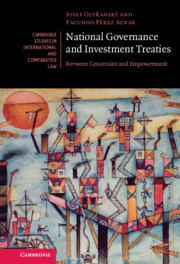Book contents
- National Governance and Investment Treaties
- Cambridge Studies in International and Comparative Law
- Reviews
- National Governance and Investment Treaties
- Copyright page
- Dedication
- Contents
- Acknowledgements
- Abbreviations
- 1 National Governance and Investment Treaties
- 2 Situating the Engagements with the Investment Treaty Regime in Argentina, the Czech Republic, India, and Mexico
- Part I Discursive and Ideological Effects of Investment Treaties on National Governance
- Part II Formal and Informal Institutional Effects of Investment Treaties on National Governance
- 5 The State’s Institutional Rearrangements and International Investment Agreements
- 6 Defending the State in ISDS and Preventing Disputes
- 7 International Investment Agreements and National Lawmaking (Part 1)
- 8 International Investment Agreements and National Lawmaking (Part 2)
- Conclusion
- Index
8 - International Investment Agreements and National Lawmaking (Part 2)
Multifaceted Uses of IIA Arguments in Lawmaking
from Part II - Formal and Informal Institutional Effects of Investment Treaties on National Governance
- National Governance and Investment Treaties
- Cambridge Studies in International and Comparative Law
- Reviews
- National Governance and Investment Treaties
- Copyright page
- Dedication
- Contents
- Acknowledgements
- Abbreviations
- 1 National Governance and Investment Treaties
- 2 Situating the Engagements with the Investment Treaty Regime in Argentina, the Czech Republic, India, and Mexico
- Part I Discursive and Ideological Effects of Investment Treaties on National Governance
- Part II Formal and Informal Institutional Effects of Investment Treaties on National Governance
- 5 The State’s Institutional Rearrangements and International Investment Agreements
- 6 Defending the State in ISDS and Preventing Disputes
- 7 International Investment Agreements and National Lawmaking (Part 1)
- 8 International Investment Agreements and National Lawmaking (Part 2)
- Conclusion
- Index
Summary
In this second chapter dealing with the IIAs’ impact on lawmaking, we analyse and categorise other identified instances in which an IIA argument was used in the lawmaking processes. Here, we discuss invocations of IIA arguments in the lawmaking that appeared in a similar shape or form across the studied countries. We also documented cases that, while politically less significant, demonstrate curious intersections between IIAs and national lawmaking. First, we centre on four specific subject-matter areas in which the IIA argument has featured. Those relate to potentially discriminatory regulations, transparency of the public administration, fundamental rights, and expropriation and nationalisation measures. Then, we close with a section highlighting a miscellany of somewhat unexpected uses of the IIA argument. We bring attention to the attempts at influencing IIA obligations through national legislation, ambiguous examples of regulatory chill, and instances of vague and complementary uses of IIA arguments in lawmaking. The chapter presents general conclusions and broader insights on the IIAs’ impact on lawmaking, especially regarding the regulatory chill and positive spill-over theses.
Keywords
- Type
- Chapter
- Information
- National Governance and Investment TreatiesBetween Constraint and Empowerment, pp. 260 - 278Publisher: Cambridge University PressPrint publication year: 2023



